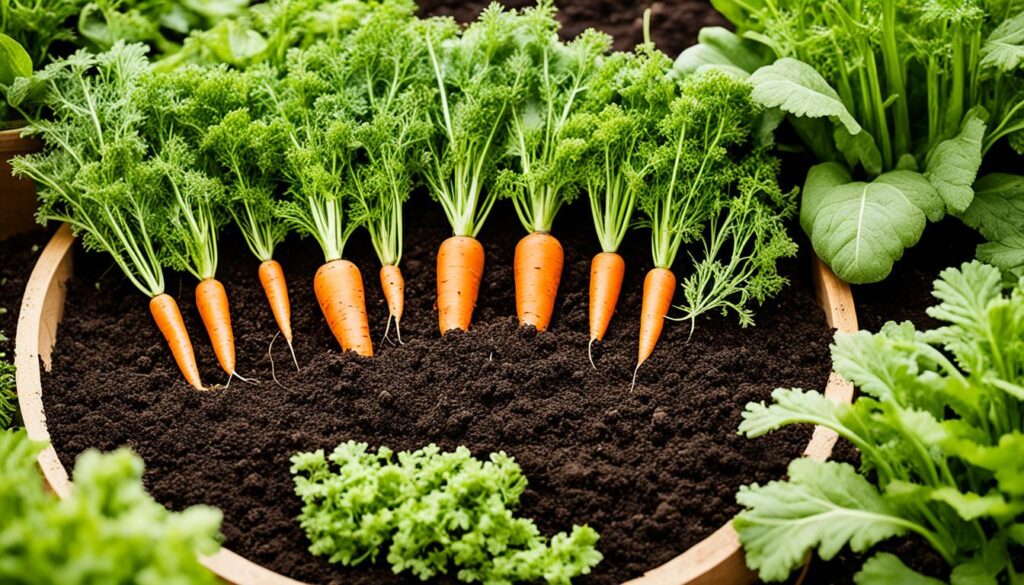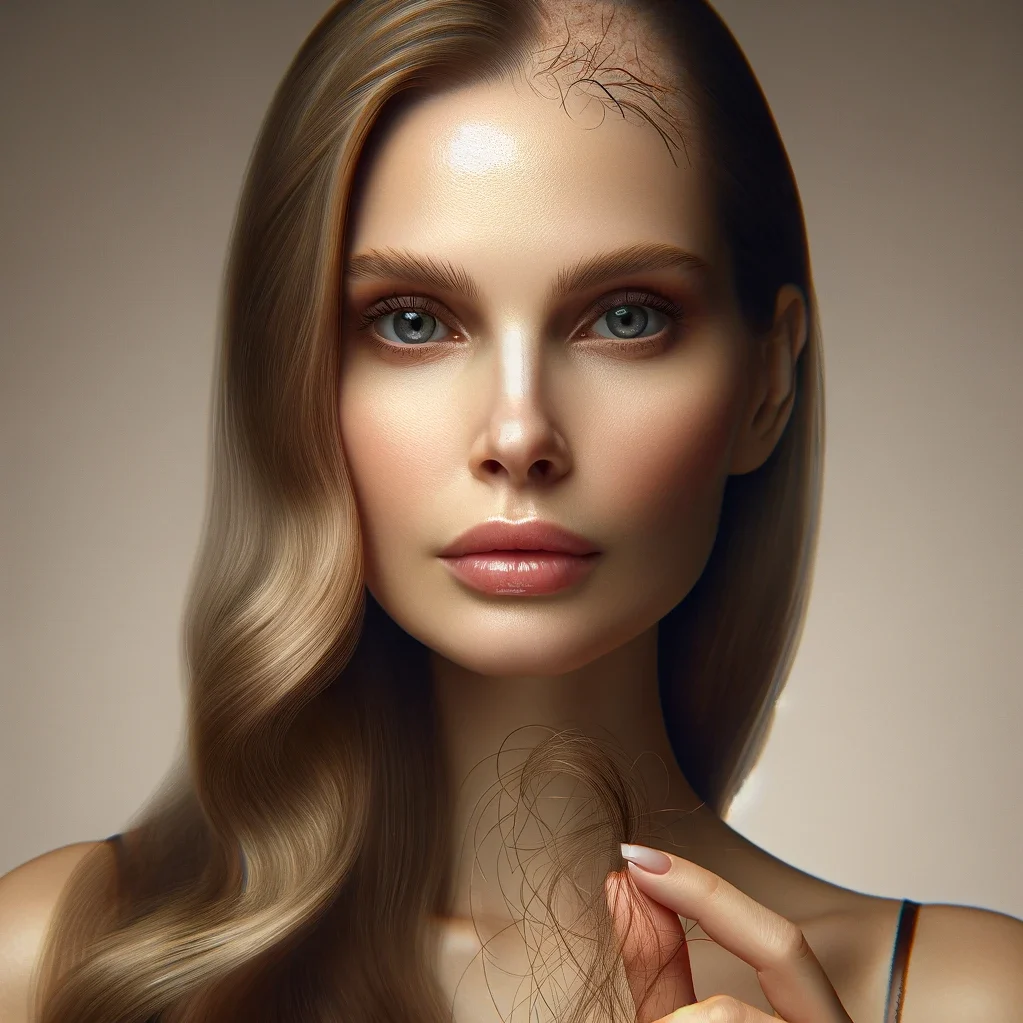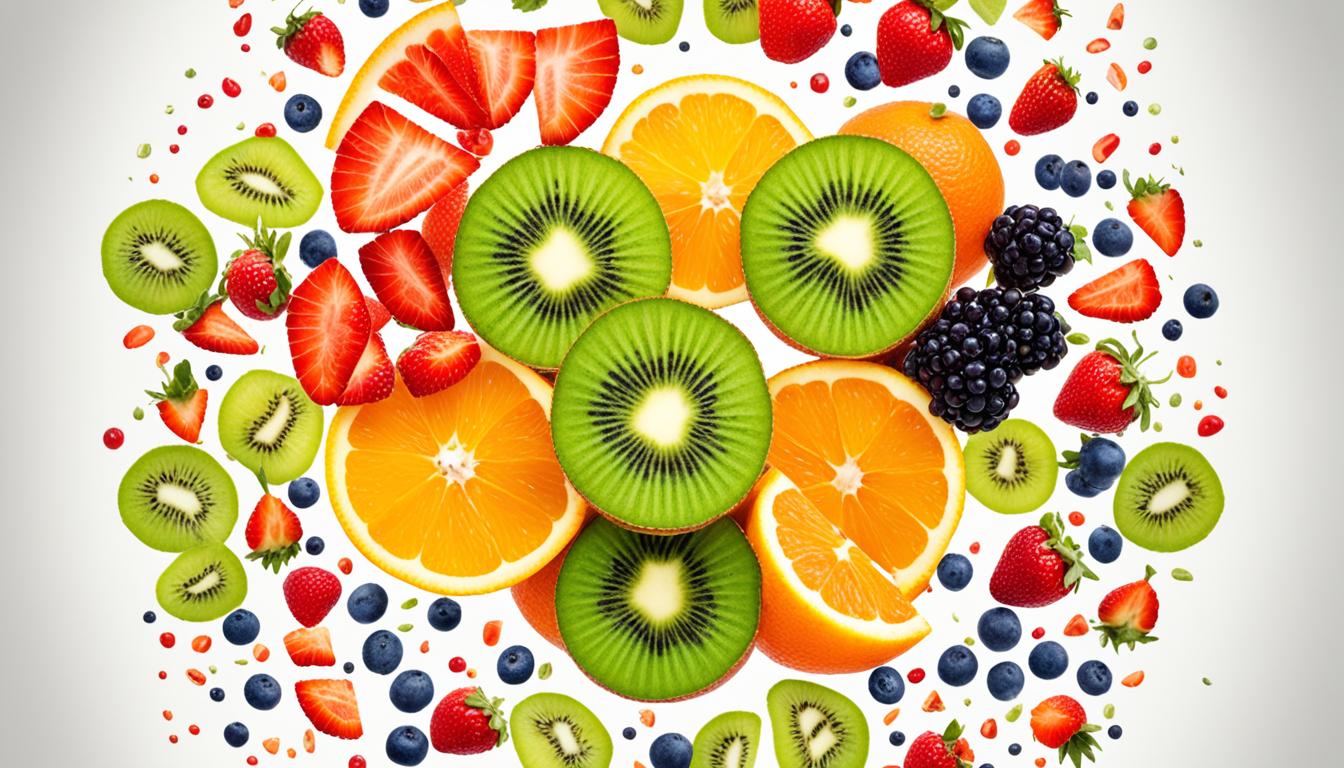Did you know that vitamins can play a crucial role in promoting hair growth? The right combination of vitamins can not only support hair follicle health but also promote cell growth, fight free radicals, and ensure proper nutrient delivery to the scalp. If you’re looking to enhance your natural hair growth and combat vitamin deficiency-related hair loss, it’s essential to understand which vitamins are best suited for the task.
Key Takeaways:
- Vitamins are vital for promoting hair growth and combating hair loss caused by vitamin deficiencies.
- Key vitamins for hair growth include vitamin A, biotin, vitamin C, vitamin D, iron, omega-3 fatty acids, and vitamin E.
- Zinc, protein, keratin, collagen, ashwagandha, and ginseng can also contribute to healthy hair growth.
- A well-balanced diet and targeted supplementation can help fill nutritional gaps and support optimal hair growth.
- Nourishing your body from the inside out is key for achieving and maintaining healthy hair growth.
The Role of Multivitamins for Hair Growth
When it comes to promoting hair growth, incorporating multivitamins into your routine can make a significant difference. Multivitamins provide a comprehensive blend of essential nutrients that are crucial for maintaining healthy hair follicles. In particular, they contain valuable B vitamins, vitamin D, and zinc, which play vital roles in supporting hair health and growth.
B vitamins are known to support the creation of red blood cells, which carry oxygen and vital nutrients to the scalp and hair follicles. This increased blood flow helps to nourish the hair and promote overall hair health. Foods rich in B vitamins include seafood, whole grains, and dark leafy greens.
Zinc is another important nutrient for hair growth as it contributes to the structure and health of the hair shaft. It helps to regulate oil production in the scalp, preventing excessive dryness or oiliness. Zinc can be found in various foods such as beef, lentils, oysters, and spinach.
Vitamin D has also been linked to hair growth. It is believed to stimulate the growth of new hair follicles, resulting in thicker and fuller hair. Natural sources of vitamin D include fatty fish, mushrooms, and fortified juices, milk, and cereals.
By incorporating multivitamins rich in B vitamins, vitamin D, and zinc into your daily regimen, you can ensure that your hair receives the necessary nutrients for optimal growth and health. However, it’s important to remember that while multivitamins can be beneficial, they should not be seen as a substitute for a well-balanced diet.
Next, we’ll explore the powerful impact of vitamin A on hair growth and how it can contribute to luscious, vibrant locks.
The Power of Vitamin A for Hair Growth
Vitamin A is a crucial nutrient when it comes to promoting healthy hair growth. This essential vitamin plays a significant role in maintaining the overall health of our hair follicles.
Vitamin A supports cell growth, which is essential for the development and regeneration of hair follicles. By promoting the growth of new cells, vitamin A helps ensure that our hair grows strong and healthy.
Not only does vitamin A directly impact hair growth, but it also has a positive effect on the health of our skin glands. One of the primary functions of these glands is sebum production. Sebum is a natural oil that moisturizes the scalp and keeps our hair hydrated and nourished.
By promoting the production of sebum, vitamin A helps maintain a healthy scalp environment, preventing dryness and the associated problems it can cause, such as dandruff and scalp irritation. When our scalps are properly moisturized, our hair can grow to its full potential.
It’s important to note that while vitamin A is essential for hair growth, excessive intake can have adverse effects. Too much vitamin A can lead to hair loss. Therefore, it’s crucial to follow the recommended dietary allowance (RDA) of 700 micrograms for women and 900 micrograms for men.
Natural sources of vitamin A include milk, eggs, yogurt, sweet potatoes, carrots, spinach, pumpkin, and kale. By incorporating these foods into your diet, you can ensure you’re getting an adequate amount of vitamin A to support healthy hair growth.

The Impact of Vitamin C on Hair Health
Vitamin C is a powerful antioxidant that plays a crucial role in promoting healthy hair. It helps fight free radicals, which can damage the hair follicles and impede hair growth. In addition to its antioxidant properties, vitamin C is essential for the production of collagen and keratin.
The Role of Vitamin C in Fighting Free Radicals
Free radicals are unstable molecules that can cause oxidative stress in the body, leading to cellular damage. When it comes to hair, free radicals can weaken the hair follicles and contribute to hair loss. Vitamin C acts as an antioxidant, neutralizing these free radicals and protecting the hair follicles from damage.
By incorporating foods rich in vitamin C into your diet, you can ensure that your body receives an adequate supply of this essential nutrient. Strawberries, peppers, citrus fruits, and leafy greens are excellent sources of vitamin C. Alternatively, you can also consider taking vitamin C supplements to meet your daily requirements.
The Role of Vitamin C in Collagen Production
Collagen is a protein that forms the structure of the hair shaft. It provides strength and elasticity, contributing to healthy and vibrant hair. Vitamin C plays a crucial role in the production of collagen, ensuring that your hair remains strong and resilient.
By supporting collagen synthesis, vitamin C helps maintain the structural integrity of the hair shaft. This, in turn, prevents breakage and promotes overall hair health. Including foods like oranges, strawberries, and bell peppers in your diet can provide a natural source of vitamin C and support collagen production.
The Role of Vitamin C in Keratin Production
Keratin is the primary protein that makes up the hair strands. It provides structure and strength to the hair, preventing brittleness and breakage. Vitamin C is involved in the biosynthesis of keratin, ensuring optimal hair growth and health.
Consuming foods rich in vitamin C can supply your body with the necessary nutrients to support keratin production. Fruits like kiwi, papaya, and pineapple, along with vegetables like broccoli and Brussels sprouts, are excellent sources of vitamin C.

Overall, vitamin C plays a vital role in maintaining hair health. Its antioxidant properties help combat free radicals, while its involvement in collagen and keratin production ensures strong and resilient hair. By including vitamin C-rich foods in your diet, you can support optimal hair growth and maintain gorgeous locks.
The Role of Iron in Hair Growth
Iron is crucial for the growth and health of our hair. It plays a vital role in the production of red blood cells, which carry oxygen to the scalp and hair follicles. Without sufficient iron, the hair follicles may not receive an adequate oxygen supply, leading to hair loss and stunted growth.
An iron deficiency can result in anemia, a condition characterized by a low level of red blood cells. Anemia further aggravates hair loss and contributes to a lack of energy and fatigue.
To support optimal hair growth, it is important to incorporate iron-rich foods into your diet. Here are some excellent sources of iron:
- Red meat
- Dark leafy greens like spinach and kale
- Legumes such as lentils and chickpeas
- Tofu and tempeh
- Pumpkin seeds
If you are vegetarian or vegan and do not consume red meat frequently, you may be at a higher risk of iron deficiency. In such cases, it is advisable to consult with your doctor or a healthcare professional who may recommend iron supplementation.
Incorporating iron-rich foods or taking iron supplements can help ensure that your body has an adequate supply of iron to support the growth and health of your hair.
Essential Fatty Acids and Biotin for Hair Growth
When it comes to promoting healthy hair growth, essential fatty acids and biotin are two key nutrients that play a crucial role. Omega-3 fatty acids, in particular, are essential for cell health and are believed to contribute to a healthier scalp and hair. Including omega-3-rich foods in your diet or taking fish oil supplements can help ensure an adequate intake of these vital fatty acids. Good food sources of omega-3 fatty acids include fish like salmon, mackerel, and sardines, as well as flaxseed and walnuts.
Another important nutrient for hair growth is biotin, a water-soluble vitamin that has gained popularity for its positive effects on hair health. Biotin is necessary for the production of keratin, a protein that makes up the structure of hair strands. It is recommended to consume 3-5 milligrams of biotin daily to support hair growth. You can obtain biotin from various food sources, including egg yolks, whole grains, fish, seeds, nuts, sweet potatoes, broccoli, cauliflower, and meat.
Biotin and omega-3 fatty acids work together to promote strong, healthy hair growth. While omega-3 fatty acids nourish the scalp and hair follicles, biotin supports the production of keratin, ensuring that hair strands are strong and resilient.
By incorporating omega-3 fatty acids and biotin into your diet, you can provide your hair with the essential nutrients it needs for optimal growth and health. However, it’s important to note that individual results may vary, and it’s always best to consult with a healthcare professional before starting any new supplements or making significant changes to your diet.
Conclusion
Achieving optimal hair growth requires a holistic approach that encompasses a well-balanced diet and targeted supplementation. Vitamins, such as Vitamin A, C, D, E, and Biotin, along with minerals like zinc and iron, play an essential role in supporting hair health and growth. These nutrients promote cell growth, fight free radicals, and ensure proper nutrient delivery to the scalp.
Additionally, protein, keratin, collagen, ashwagandha, and ginseng can also contribute to healthy hair growth. These ingredients nourish the hair follicles, strengthen the hair strands, and promote overall hair vitality. However, it’s important to note that the success of using supplements depends on individual factors and the duration of hair loss.
In addition to supplementation, practicing self-care and managing stress levels are crucial for maintaining healthy hair. Stress can disrupt the hair growth cycle, leading to hair loss. Implementing techniques like scalp massage can improve blood flow to the hair follicles and stimulate hair growth.
While supplements and scalp massage can support hair growth, it’s important to remember that a balanced diet is the foundation for healthy hair. Nourishing your body from the inside out with a variety of fruits, vegetables, lean proteins, and whole grains will provide the essential nutrients needed for vibrant, strong, and resilient hair.
FAQ
Which vitamins are best for hair growth?
Some key vitamins that can help boost hair growth include vitamin A, biotin, vitamin C, vitamin D, iron, omega-3 fatty acids, and vitamin E. These vitamins support hair follicle health, promote cell growth, fight free radicals, and ensure proper nutrient delivery to the scalp.
What is the role of multivitamins in hair growth?
Multivitamins can be a valuable addition to your hair growth regimen. They provide a range of essential nutrients, including B vitamins, zinc, and vitamin D, that are important for hair follicle health. B vitamins support the creation of red blood cells, while zinc contributes to overall hair health. Vitamin D may help promote the growth of new hair follicles.
How does vitamin A contribute to hair growth?
Vitamin A plays a crucial role in hair growth as it supports cell growth, which is essential for hair growth. Vitamin A also benefits the skin glands by promoting the production of sebum, which moisturizes the scalp and keeps hair healthy.
What is the impact of vitamin C on hair health?
Vitamin C is a powerful antioxidant that helps fight free radicals, which can damage hair and impede its growth. This vitamin is also essential for the production of collagen, a protein that forms the structure of hair. Additionally, vitamin C plays a role in creating keratin, the primary protein in hair.
How does iron contribute to hair growth?
Iron is crucial for hair growth and health. It is used by red blood cells to carry oxygen to the scalp and hair follicles. Iron deficiency can lead to anemia, which in turn can cause hair loss. Incorporating iron-rich foods into your diet, such as red meat, dark leafy greens, and legumes, can help support optimal hair growth.
What are essential fatty acids and biotin’s role in hair growth?
Omega-3 fatty acids are critical for cell health and are believed to contribute to a healthier scalp and hair. Biotin, a water-soluble vitamin, is known for its positive effects on hair growth. Consuming foods rich in omega-3 fatty acids and biotin or taking supplements can help support hair growth.
What is the importance of a balanced diet and holistic approach for hair growth?
Achieving optimal hair growth requires a holistic approach, including a well-balanced diet and targeted supplementation. In addition to vitamins and minerals, other factors such as protein, keratin, collagen, ashwagandha, ginseng, self-care, stress management, and scalp massage can contribute to healthy hair growth. Nourishing your body from the inside out is key.


1 thought on “Unlock Hair Growth: Which Vitamin is Key?”